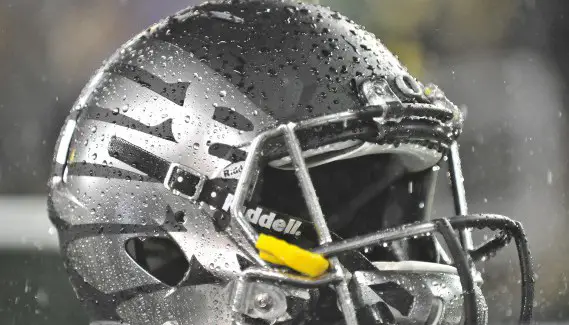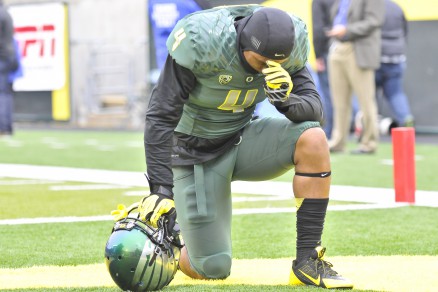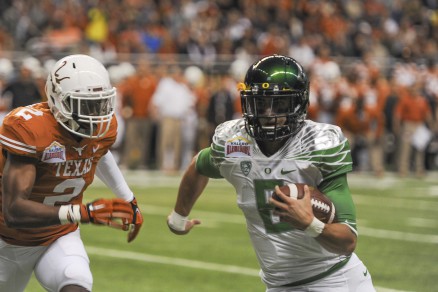We all love rock ’em, sock ’em football, but with all the recent concern for player safety, we need to give thought to just what can be done to make the game safer for the players. Basically there are only two ways to do this: more protective equipment and further regulating the conduct of those involved in the game.
You would have to believe that Nike and its over-matched competitors are doing all they can to make their equipment as safe as possible under the current parameters. After all, sports gear is a competitive business and there are big dollars at stake. So the only reasonable way to make equipment all that much safer is to change the parameters, and I’m not sure that this would appeal to either players or fans.
For instance, head injuries could be reduced by having padding both inside and outside the helmet’s shell. Three inches of foam with a good durable outer membrane would pretty much negate the need to enforce the targeting rules that referees seem to miss half the time anyway.
As for knee and ankle injuries, requiring players to wear braces for all limb joints would probably help, although it would, of course, slow the game down and probably make every team revert to Stanford’s style of play (minus the passing game, of course, since it would be difficult to throw well wearing an elbow brace).
Given the number of players who roll up their pant legs to give their knees maximum movement, and given how boring Stanford football is (Yes, Stanford, I know you beat the Ducks the last two years, but that’s not the point here, so bear with me.), I’m not sure this is a viable alternative.
So, unless we want a game where bobble heads push it up the middle for three and four yards a whack, we are probably looking at improving safety by adjusting the conduct of the game.
Two ideas that would be effective and easy to implement come to mind.
First, do away with the reward for ripping helmets off opposing teams’ players. This is such a no-brainer that even someone with 17 concussions should be able to figure it out.
I’m sure that there was good intent on sending a player to the sidelines for a play if he loses his helmet. I think it had something to do with players taking off their helmets on the field so that they could trash talk more effectively.
Or maybe it was to punish those who forgot to fasten their chin straps. It was fairly obvious in the Alamo Bowl, though, that the Texas players had been coached to rip the helmet off of Marcus Mariota’s head to get him off the field, even if it was just for one play. And it probably saved them at least one touchdown, if not two, so it was an effective miscarriage of justice.
But at some point, when you’ve got a 300-pound defensive tackle or a 250-pound linebacker ripping on your helmet, it’s a good idea to have the helmet come off rather than have your neck twisted and lengthened by half a foot or so. So. why do the rules encourage the ripping off of heads? This is a stinky rule that needs to be changed.
Second, safety could be improved by instituting instant replay review of dirty plays that the officials on the field fail to call. Half the world is watching the game on the telly and sees the dirty hit, usually from about five different angles in slow motion. And ‘glasses ref’ is just standing there smiling with his yellow hanky in his pocket, thinking about his next game of golf or his retirement, which I understand has finally happened.
If we are really concerned about player safety, let’s use the technology that’s available and not rely on some optometrist’s out-dated prescription or count on the on-field officials to always be in position to make the call.
Within reason, it is obviously prudent to work toward the safest football possible without ruining what is well known to be a risky game. The Northwestern University football players are pushing for unionization on the basis of “safety,” even though we all know that their bottom line is probably, “Well, if you can’t make the game safe, then you have to pay us.” What’s more, they appear ready to take their game to the courtroom to voice their demands, and this carries its own set of risks.
Outside of all the potential for conflict with Title IX (equal opportunity for women’s sports), one risk is that courts, or the various state legislatures, will step in and establish boundaries — such as criminal prosecution for injuring opponents while playing outside the rules.
Ironically, it was Jeffrey Standen of the Northwestern University School of Law who had quite a bit to say on this topic in this 1999 essay. There have been a surprisingly large number of suits and charges filed when players have caused damage by going outside the rules of the game, and the judicial rulings have been all over the board.
By inviting the court system into the game, the Northwestern University football players may well be opening Pandora’s box. The threat of serving time for a felony stemming from targeting — or some other dirty play — would make players think twice about giving their all.
The Pac-12 is to be commended for being a leader in establishing practice standards to promote player safety, and I’m happy that we don’t hear a lot of whining about safety and pay for play from the Oregon players. Players who are clamoring for safer conditions and pay for play should give some thought to the choice they made by going out for football in the first place.
Maybe it’s not for them. There are many other sports available, but they went for the one with the most excitement, the most people in the stands, the coolest facilities, the most attention from trainers, coaches, academic tutors and television, along with potential for fame and financial reward, that just isn’t there for a lot of sports.
The downside is that football is an inherently dangerous sport, and nothing short of drastic changes to the game will make it anything different. High risk with potentially big payoffs and security just don’t go together. Ask any financial advisor.
Main photo by Kevin Cline
Related Articles:
Chip Kelly Update: Everything's Good Again ...
Chip Kelly Update: Wailing and Gnashing of Teeth
Shock and Awe -- The Oregon Ducks' Football Hangover Effect
Despite Lopsided Score, Georgia State "Never Stopped Believing"
Hope Springs Eternal for Ducks
Incompetent Pac-12 Officials: How Do You Miss ALL of THIS?
Mike (Editor-in-Chief) is a 1970 graduate of the University of Oregon where he attended the Honors College and received all-conference honors as a swimmer. After college, Mike ran for the Oregon Track Club and narrowly missed qualifying for the US Olympic Trials in the marathon. He continues his involvement in sports with near-daily swimming or running workouts, occasional masters swim competition (where he has received two Top-10 World rankings), providing volunteer coaching to local triathletes and helping out with FishDuck.com.
Mike lives on 28 acres in the forest near Sandpoint, Idaho, where he has served as a certified public accountant for most of his working career. His current night job is writing novels about Abby Westminster, the only known illegitimate daughter of Britain’s finest secret agent who has to bring down arch-villains plotting dastardly deeds. And, yes, Abby is also a DUCK!



